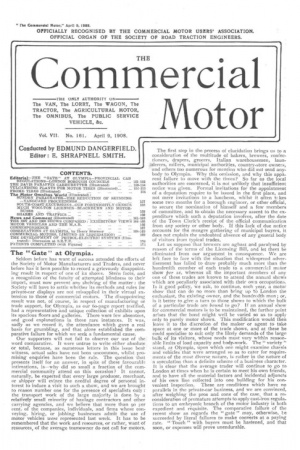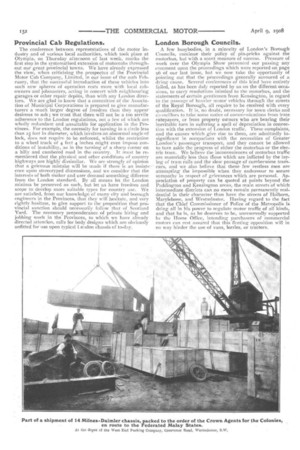The " Gate " at Olympia.
Page 1

Page 2

If you've noticed an error in this article please click here to report it so we can fix it.
Seldom before has want of success attended the efforts of the Society of Motor Manufacturers and Traders, and never before has it been possible to record a grievously disappointing result in respect of one of its shows. Stern facts, and a recognition of the fatuity of attempted blindness to their import, must now prevent any shelving of the matter : the Society will have to settle whether its methods and rules for private-car displays are not misapplied in their virtual extension to those of commercial motors. The disappointing result was not, of course, in respect of manufacturing or trade support, for Olympia, as our Go-page report testified, had a representative and unique collection of exhibits upon its spacious floors and galleries. There were few absentees, and good explanations in those rare instances. It was, sadly as we record it, the attendance which gave a real basis for grumbling, and that alone established the comparative failure for which we seek a fundamental cause.
Our supporters will not fail to observe our use of the word comparative. It were untrue to write either absolute or total, because, as numerous letters in this issue healwitness, actual sales have not been uncommon, whilst promising enquiries have been the rule. The question that presents itself for an answer, in spite of these favourable intimations, is—why did so small a fraction of the commercial community attend on this occasion? It cannot, naturally, be expected that every large producer, merchant, or shipper will evince the needful degree of personal interest to induce a visit to such a show, and we are brought to reason number one for the presence of specialists only : the transport work of the large majority is done by a relatively small minority of haulage contractors and other carrying agencies, and we believe that more than go per cent, of the companies, individuals, and firms whose conveying, hiring, or jobbing businesses admit the use of motor vehicles were represented fast week. It has to be remembered that the work and resources, or rather, want of resources, of the average tearnowner do not call for motors,
The first step in the process of elucidation brings us to a consideration of the multitude of bakers, brewers, confectioners, drapers, grocers, Italian warehousemen, IaunAlerers, millers, municipal authorities, country-store owners, and others too numerous for mention who did not send anybody to Olympia. Why this omission, and why this apparent failure to move with the times? So far as the local authorities are concerned, it is not unlikely that insufficient notice was given. Formal invitations for the appointment of a deputation require to be issued in the first place, and not mere invitations to a luncheon, whilst it often tzkes some two months for a borough engineer, or other official, to secure the nomination of himself and a few members of committee, and to obtain the necessary assent to the expenditure which such a deputation involves, after the date of the Town Clerk's receipt of the official communication from any society or other body. If this lack of due notice accounts for the meagre gathering of municipal buyers, it does not explain the undoubted absence of any general body of visitors from typical trades.
Let us suppose that brewers are aghast and paralysed by reason of the terms of the Licensing Bill, and let them be eliminated from our argument in consequence. We are left face to face with the situation that widespread advertisement has failed to draw probably much more than the hundredth member of each trade to a corm-nen:id motor show per se, whereas all the important members of any one of these trades are known to attend the annual shows which are peculiarly associated with their own occupations. Is it good policy, we ask, to continue, each year, a motor show that can do no more than bring up to London the enthusiast, the existing owner, and the hundredth men; or, is it better to give a turn to those shows to which the bulk of a particular trade are bound to go?. If an annual show for commercial motors is to be maintained, the further point arises that the bond might well he varied so as to apply only to purely motor shows. This modification would then leave it to the discretion of the maker or agent to take space at one or more of the trade shows, and at these he could specialise to suit only the likely demands of the large bulk of its visitors, whose needs must vary within reasonable limits of load capacity and body-work. The " variety" stand, at Olympia, upon which one might examine chassis and vehicles that were arranged so as to cater for requirements of the most diverse nature, is rather in the nature of a speculation than a definite scheme of a business character. It is Clear that the average trader will continue to g'o to London at times when he is certain to meet his own friends, and to have all the material factors and incidental adjuncts of his own line collected into one building for his convenient inspection. These are conditions which have no parallels in the private-car business, and we are convinced, after weighing the pros and cons of the case, that a reconsideration of premature attempts to apply cast-iron regulations to an embryonic branch of the motor industry is both expedient and requisite. The comparative failure of the recent show as regards the "gate " may, otherwise, be succeeded by literal failures to make converts at a paying rate. "Touch " with buyers must be hastened, and that soon, or expenses will prove unendurable.
Provincial Cab Regulations.
The conference between representatives of the motor industry and of various local authorities, which took place at Olympia, on Thursday afternoon of last week, marks the first step in the systematised extension of motorcabs throughout our great provincial towns. We have already expressed the view, when criticising the prospectus of the Provincial Motor Cab Company, Limited, in our issue of the aoth February, that the successful introduction of these vehicles into such new spheres of operation rests more with local cabowners and johmasters, acting in concert with neighbouring garages or other repair depots, than with any London directors. We are glad to know that a committee of the Association of Municipal Corporations is prepared to give manufacturers a much larger degree of freedom than they appear desirous to ask ; we trust that there will not be a too servile adherence to the London regulations, not a few of which are wholly redundant and unsuitable for application in the Provinces. For example, the necessity for turning in a circle less than 25 feet in diameter, which involves an abnormal angle of lock, does not require to be enforced, whilst the restriction to a wheel track of 4 feet 4 inches might even impose conditions of instability, as in the turning of a sharp corner on a hilly and cambered road in the country. It must be remembered that the physical and other conditions of country highways are highly dissimilar. We are strongly of opinion that a grievous mistake will be made if there is an insist= enee upon stereotyped dimensions, and we consider that the interests of both maker and user demand something different from the London standard. By all means let the London minima be preserved as such, but let us have freedom and scope to develop more suitable types for country use.. We are satisfied, from our knowledge of many city and borough engineers in the Provinces, that they will hesitate, and very rightly hesitate, to give support to the proposition that provincial sanction should necessarily follow that of Scotland Yard. The necessary preponderance of private hiring and jobbing work in the Provinces, to which we have already directed attention, calls for body designs which are obviously unfitted for use upon typical -London chassis of to-day.
London Borough Councils.
A few busybodies, in a minority of London's Borough Councils, continue their policy of pin-pricks against the motorbus, but with a scant measure of success. Pressure of work over the Olympia Show prevented our passing any comment upon the proceedings which were reported on page 96 of our last issue, but we now take the opportunity of pointing out that the proceedings generally savoured of a dying cause. Several conferences of this kind have entirely failed, as has been duly reported by us on the different occasions, to carry resolutions inimical to the motorbus, and the statements of certain g-entlemen-from Kensington, in regard to the passage of heavier motor vehicles through the streets of the Royal Borough, all require to be received with every qualification. It is no doubt, necessary for town clerks and councillors to take some notice of cornnumications from irate ratepayers, or from property owners who are bearing their inevitable turn in suffering a spell of depreciation in connection with the extension of London traffic. These complaints, and the causes which give rise to them, are admittedly insignificant in comparison with the necessities of Greater London's passenger transport, and they cannot be allowed to turn aside the progress of either the motorbus or the electric tram. We believe the inconveniences of motorbus traffic are materially less than those which are inflicted by the layingof tram rails and the slow passage of cumbersome tramears, and we also believe that these few restless men are attempting the impossible when they endeavour to secure sympathy in respect of grievances which are personal. Appreciation of property can be quoted at points beyond the Paddington and Kensington areas, the main streets of which intermediate districts can no more remain permanently residential in their character than have the streets of Holborn, Marylebone, and Westminster. Having regard to the fact that the Chief Commissioner of Police of the Metropolis is doing allin his power to regulate motor traffic of all kinds, and that he is, as he deserves to-he, unreservedly supported by the Home Office, intending purchasers of commercial motors can rest assured that this fleeting opposition will in no way hinder the use of vans, lorries, or tractors.




























